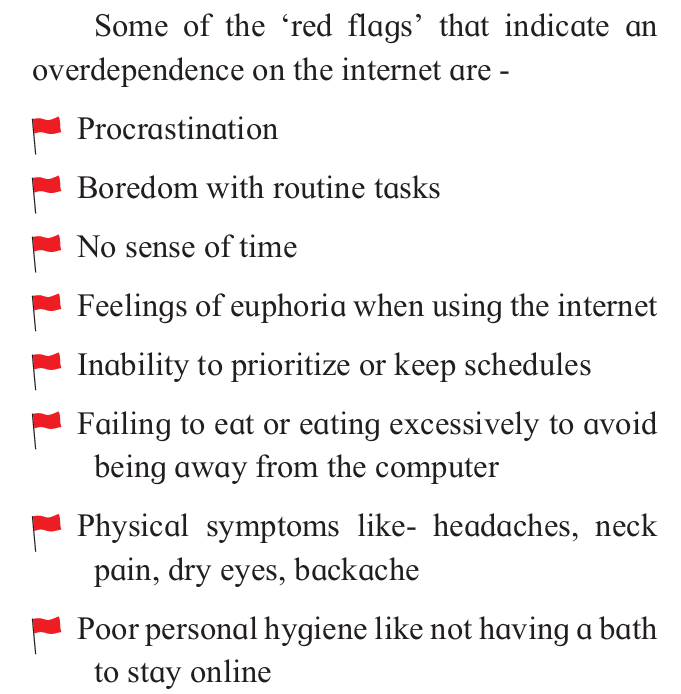First Aid in Mental Health
Introduction
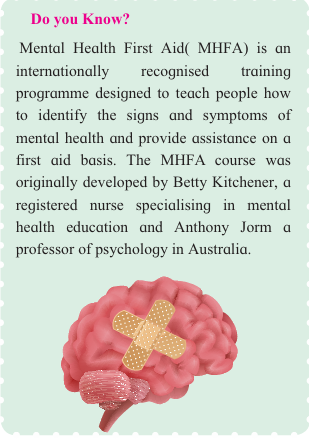
Need for first aid in mental health
Some of the hurdles to receiving treatment
Lack of knowledge
Lack of awareness
Cost of treatment.
Non medical explanation for mental illness like evil spirits, black magic etc.
Shortage of trained mental health professionals
Unwillingness of the individual and the family members to get treatment due to social stigma.
Untrained individuals giving wrong advice.
Slow improvements in the individuals behavior.
Reasons why first aid in mental health is required.
Stigma associated with mental illness
One of the major obstacles to getting help from a mental health professional is the stigma that is attached to mental illness. We fear things we do not understand. In the same way our lack of understanding of mental illness makes us fear it.
This lack of knowledge and awareness makes us-
a) Blame the individual i.e. think that mental illness is a personal failing or weakness.
b) Think that mental illness is caused as punishment for our sins.
c) Think that the person is intentionally behaving in an inappropriate way.
Shame
When we experience shame we do not want to talk about it.
It prevents us from reaching out to others and therefore we do not seek help.
It is important to remember that mental illness is caused by a complex combination of factors like genetics, socio cultural factors, environmental factors etc.
It is NEVER caused because of personal weakness. Thus blaming the individual who has been diagnosed with a mental illness is not helpful. Instead, it will be beneficial to provide support and show understanding towards the individual.
People do not always know how to respond
People with mental illness do not always seek help
It is seen that very often people with mental illness will not go to a mental health professional for treatment. There are a number of reasons for this.
Some of the reasons are as follows.
Culture- In our culture the behaviour of an individual is considered to be a reflection of one’s family. The stigma attached to mental illness, prevents individuals from seeking professional help as it might hurt the reputation of the family.
Advice from elders- Many a times we look to our elders for advice to solve our problems. People might incorrectly believe that advice and guidance of elders alone will be sufficient to cure mental illness and do not feel the need to go to a mental health professional.
Superstitions - Individuals who believe that mental illness is caused due to sins or due to supernatural forces are less likely to go to a medical professional. They do not think the illness can be treated by modern medicine and psychotherapy and prefer going to untrained professionals.
Help be provided in the following ways
1) Diagnosis - It might prevent a severe form of the illness from developing.
2) Intervention - It can help the individual get help. This is known as early intervention.
3) Relapse prevention - It can prevent the reoccurrences of the symptoms of the illness if they occur after a period of improvement.
The Algee- Action plan
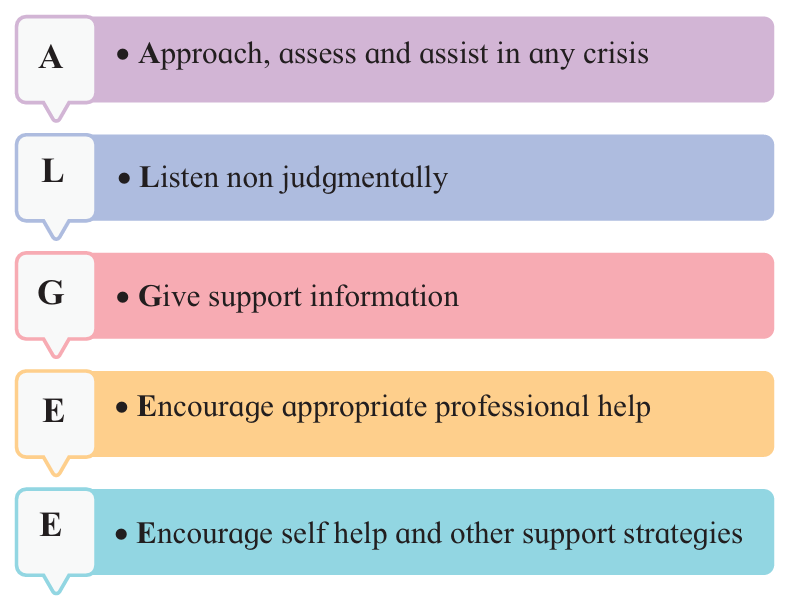
First aid in mental illness
Self help strategies are not luxuries but rather essential things that can be incorporated in your life
1. Sleep hygiene
Ensuring that you get 7 to 8 hours of sleep every night. You should try to maintain the same schedule, that is go to sleep every night at the same time and wake up at the same time every day. This will help set a routine and improve your well-being
2. Reduce screen time and digital involvement
You should disconnect everyday for some time from your gadgets. Try to set a time limit for the number of hours you will surf the internet each day.
3. Physical activity
Try to add some physical activity in your day to day schedule. This can be playing a sport or just going for a walk every day.
4. Engage in activity that you enjoy doing, cultivate hobbies
This can be any activity like reading a book or listening to your favourite song.
5. Build and maintain Social Support -
Meeting and spending time with your friends and family . Participating in social gatherings.
First aid in mental illness
First aid in depression
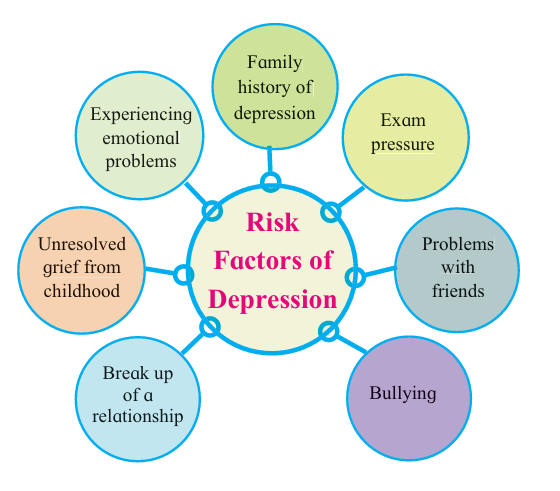
Some of the changes seen in the behaviour of individuals suffering from depression:
1. Complain of feeling tired all the time and sleep more than usual
2 Not doing household chores or forgetting to do in spite of telling them
Withdrawing from the family and spending much time alone
Getting aggressive especially seen in boys
Continuously remain sad
Perform poorly in exams
Bunk the classes or remain absent
Have difficulty in understanding what is taught in the class
Avoid friends and spend time alone
Engage in risky behaviours like alcohol and drug use etc
First aid in anxiety
Some factors contributing to anxiety are as follows:
1) Genetic factors: Individuals who have family history of anxiety that is if they have anyone in the family who was or is suffering from anxiety issues, such individuals are at a higher risk.
2) Brain chemistry: Imbalance of certain neurotransmitters
3) Traumatic event like abuse, rape or sudden death of any of the parent
4) Parental divorce
5) Stress about college exams
In general the symptoms of anxiety are as follows:
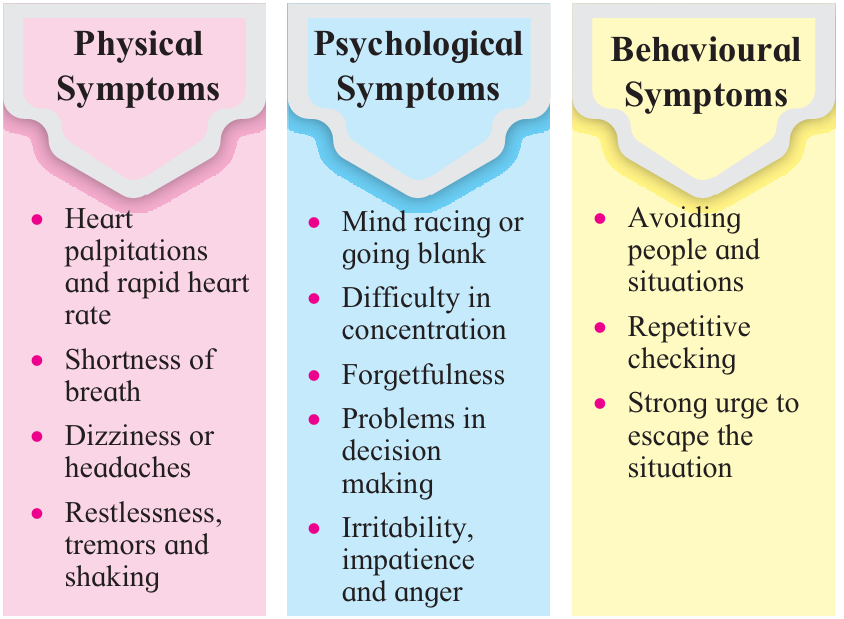
Individuals who are anxious may
1. Not want to go to college or work
2.Complain repeatedly of various physiological problems
3. Get irritated while interacting with their friends or family
4. Spend lot of time worrying about how they look
5.Be extremely quiet in the class or at work and get scared of asking questions to the teachers or colleagues
6..Sometimes ask the same questions repeatedly
7.They visibly show the physical symptoms of anxiety like sweating or excessive body movements.
Certain Behavioural issues
Sometimes people feel the need to engage in an activity or behaviour even though it has a negative impact on their mental and physical health. It can also have an impact on their ability to function at home, school, college or at work. Such behaviours are called behavioural addictions.
When an individual gets addicted to such behaviours, the following is seen
They are unable to stop performing such behaviours as they find them to be rewarding i.e. it makes them feel happy or excited.
It adversely affects significant relationships in their life.
They experience negative consequences due to constantly engaging in such behaviours.
Internet and social media usage
Now a day’s using the internet is essential. It is important to remember that the internet is not the problem. How we use it and for how long we surf the internet everyday is what can lead to problems. While the amount of time we use the internet can be a concern, so is what we are using it for.
